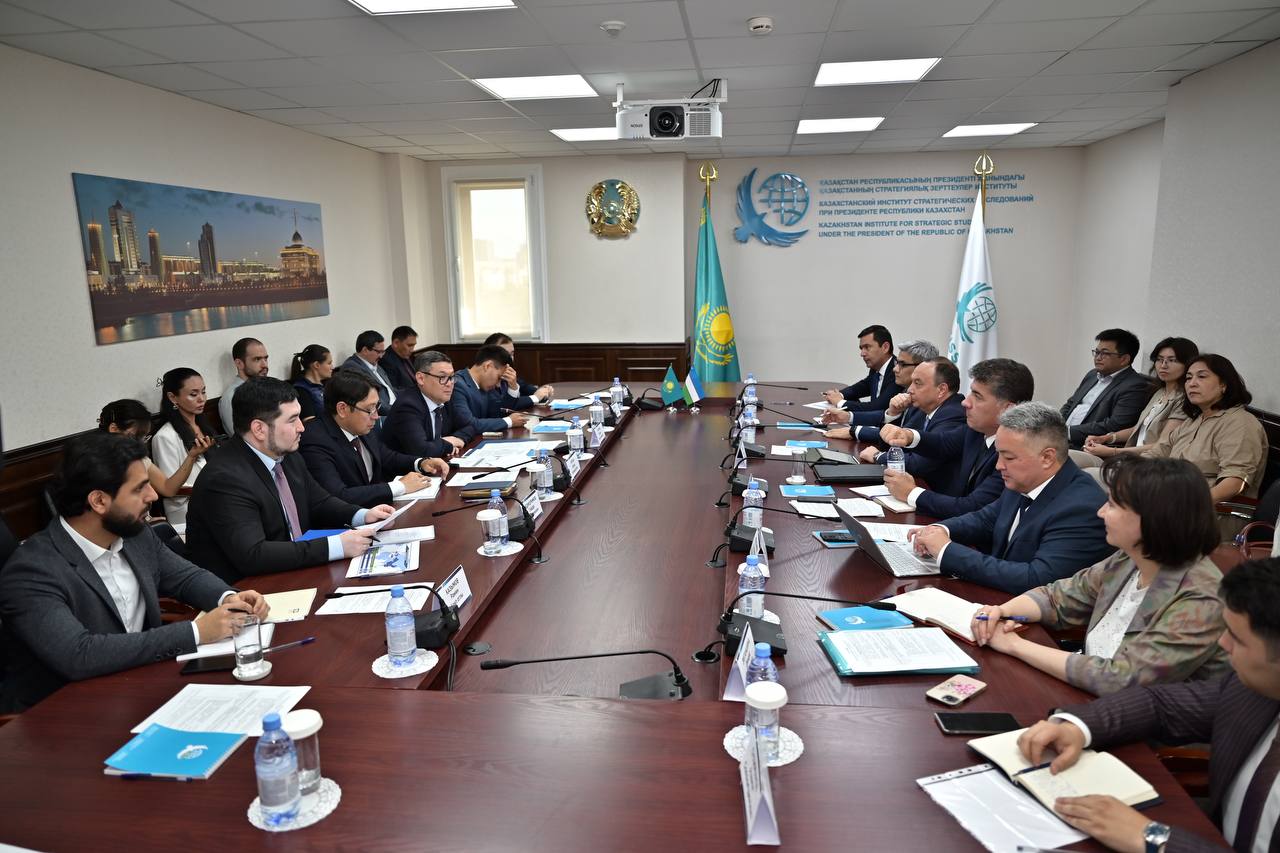WEB DESK: Kazakhstan Institute for Strategic Studies (KazISS) hosted the Kazakh-Uzbek Expert Council in Astana on Aug. 2, focusing on mechanisms for strengthening interconnectedness, regional transport policy, industrial cooperation, logistics, climate change and environmental safety. The event preceded the visit of President of Uzbekistan Shavkat Mirziyoyev to Kazakhstan and the sixth Consultative Meeting of the Heads of Central Asian States.
“Given the resources and the scale of their economic and geographical potential, Kazakhstan and Uzbekistan are the drivers of regional cooperation and integration. The success of regional Central Asian integration will depend on how we approach our cooperation. It is a big responsibility and is important to work strategically,” said Yerkin Tukumov, the KazISS director.
He noted that the Kazakh-Uzbek expert council aims to become a platform not only for discussing specific issues but also for generating ideas for joint development.
“With the expert council, we must help the leadership determine the future of our allied relations. What will the relations between Kazakhstan and Uzbekistan be in five, ten or fifty years? What will the citizens of the two countries gain from this? How will the relations of our countries affect the integration of the Central Asian region?” added Tukumov.
Strategic partnership and bilateral alliance
The meeting included initiating the memorandum on establishing the Kazakh-Uzbek expert council and sessions on state and prospects of strategic partnership, bilateral alliance, mechanisms for strengthening interconnectedness and new directions for cooperation.
“We have high hopes for this council. KazISS and the Institute for Strategic and Regional Studies under the President of Uzbekistan (ISRS) are two main structures that can engage in dialogue on important areas of bilateral cooperation and make our meetings substantive and meaningful,” said Eldor Aripov, the ISRS director.
Discussions focused on mutual economic development, industrial cooperation and transport interconnectedness, particularly integration into global value chains. Strategic priorities included Kazakhstan and Uzbekistan’s transport policies, regional industrial cooperation and Central Asia’s development as a transit hub.
Tukumov mentioned the potential for developing cross-border cooperation to simplify border control procedures, proposing high–speed train routes such as Tashkent-Shymkent, Tashkent-Taraz, Tashkent-Almaty, and Tashkent-Astana.
“The development of cross-border cooperation would have a multiplier effect and would pull other aspects of interaction,” Tukumov added.
Aripov highlighted the importance of developing transport communications, creating a coordinated policy and establishing a common energy market, where Kazakhstan could play a leading role. He noted that Kazakhstan and Uzbekistan were the first in Central Asia to elevate bilateral relations to an alliance level, institutionalized in the Supreme Interstate Council format.
Addressing climate change and environmental safety
The expert council’s agenda included cooperation on climate change, water and environmental safety. Speakers discussed green energy development, water diplomacy and shared energy partnership strategies between Kazakhstan and Uzbekistan.
Tukumov noted the need to revise agricultural practices in response to climate change, suggesting a shift from cotton to more traditional Central Asian crops such as rice.
“Our agricultural sector can leverage its competitive advantage by emphasizing the environmental friendliness and absence of genetically modified organisms (GMOs) in our products,” said Tukumov.
According to Akramjon Nematov, the ISRS first deputy director, ensuring access to water in Central Asia is crucial and is becoming more critical due to climate change, population growth, urbanization and industrial development.
Nematov pointed out that as the region’s population and economy grew so did the demand for energy. He mentioned that currently, only 2.5% of the energy demand is met through electricity trade, highlighting the need for a market platform, better regional network management and improved infrastructure.
Enhancing scientific cooperation
Tukumov called for enhanced scientific cooperation between KazISS and ISRS, proposing joint fundamental research on topics such as Central Asian identity, understanding the younger generation’s perspectives and shaping a common policy on identity.
Nematov emphasized that the key challenges for the region are the geopolitical crisis and the global international relations system, which is marked by a crisis of trust, decreased effectiveness of international institutions, political and economic blocks, protectionist measures, high inflation and resource depletion.
“With the backdrop of global and regional crises, trade tensions and tighter financing, capital outflows from developing countries are looming. The global flow of foreign direct investment decreased by 2% in 2023, and to Asian countries, including to our region, by 8%,” said Nematov.
The event featured representatives from KazISS, ISRS, the Center for Economic Research and Reforms (CERR) of Uzbekistan, the International Association of Trans-Caspian International Transport Route (TITR), also known as the Middle Corridor, the Kazenergy Association, the Regional Environmental Center of Central Asia (CAREC), the Scientific-Information Center of the Interstate Coordination Water Commission of Central Asia (SIC ICWC), the National Chamber of Entrepreneurs of Kazakhstan Atameken, and Kazakh officials.


